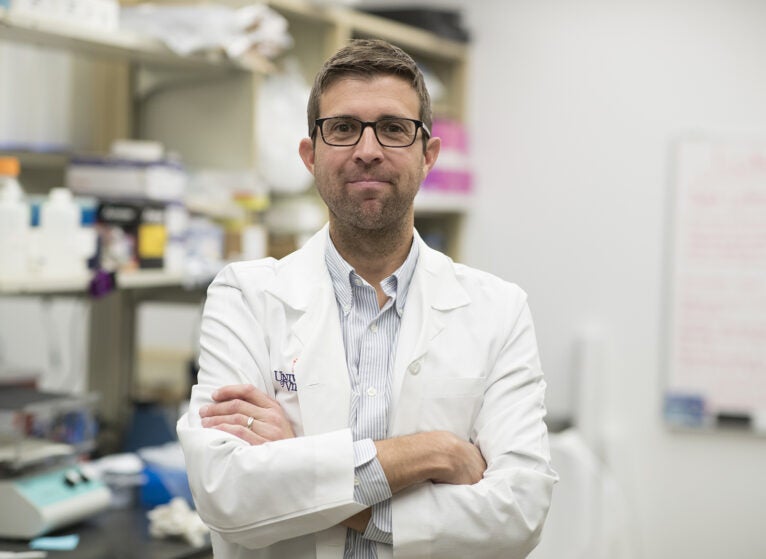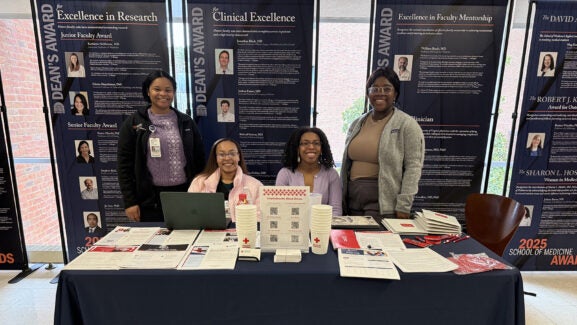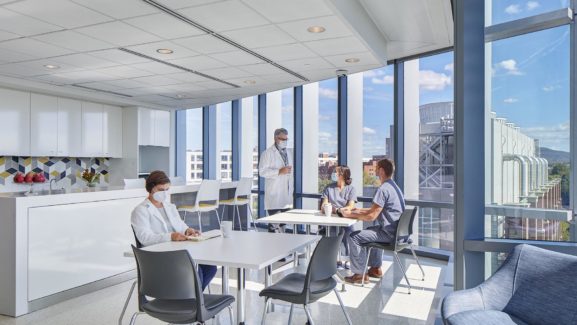

John Lukens, PhD (Photo by Dan Addison)
UVA Alzheimer’s Researcher Named 1st Head of Harrison Family Translational Research Center in Alzheimer’s and Neurodegenerative Diseases
An innovative Alzheimer’s researcher whose work is opening new frontiers in the fight against neurological diseases will serve as the inaugural director of the University of Virginia’s Harrison Family Translational Research Center in Alzheimer’s and Neurodegenerative Diseases.
John Lukens, PhD, has been part of the UVA School of Medicine’s Department of Neuroscience since 2014. In that time, he has conducted groundbreaking research charting the crucial role of the immune system in brain injury and neurodegenerative disorders. In 2023, for example, he and his team discovered a molecule in the brain responsible for orchestrating the immune system’s responses to Alzheimer’s and multiple sclerosis, a finding which could allow doctors to supercharge the body’s ability to fight those and other neurological diseases.
As director of the Harrison Family Translational Research Center in Alzheimer’s and Neurodegenerative Diseases, Lukens will oversee the launch of a cutting-edge translational research program to develop the next generation of treatments for Alzheimer’s and related neurodegenerative disorders. Housed in UVA’s upcoming Paul and Diane Manning Institute of Biotechnology, the center has been made possible by a generous $30 million gift by the family of the late David and Mary Harrison, two of UVA’s most generous benefactors.
“John Lukens is an extraordinary researcher, educator and mentor whose work is redefining how we think about Alzheimer’s,” said Melina Kibbe, MD, the dean of UVA’s School of Medicine and chief health affairs officer for UVA Health. “As director of the Harrison Family Translational Research Center in Alzheimer’s and Neurodegenerative Diseases, he will marshal UVA’s vast expertise to make bold strides against Alzheimer’s and other neurological diseases, to the benefit of patients everywhere.”
The new research center will position UVA and UVA Health as world leaders in research into Alzheimer’s and other neurodegenerative conditions. The center will serve as a nexus linking the UVA Brain Institute, which encompasses all of UVA’s neurological research, and the Departments of Neurology, Neuroscience and Neurosurgery, among others, with the Manning Institute. Together they will translate fundamental basic science discoveries into treatments for some of the most complex and challenging illnesses, including those without good treatment options.
“The launch of the Harrison Family Translational Research Center in Alzheimer’s and Neurodegenerative Diseases is another critical piece of the Manning Institute of Biotechnology coming together,” said K. Craig Kent, MD, chief executive officer of UVA Health and UVA’s executive vice president for health affairs. “We are building tremendous momentum in our mission to transform health and inspire hope for people across Virginia and beyond. It’s an incredibly exciting time at UVA.”
The Manning Institute was made possible, in large part, by a generous $100 million donation from philanthropists Paul and Diane Manning. It also represents a major investment by UVA and state leaders, who recognize the institute’s potential to tackle some of the greatest challenges in medicine while driving economic growth for the entire commonwealth. Officials expect the institute will generate hundreds of jobs directly, and potentially thousands indirectly, by drawing biotech and pharmaceutical companies to a new “ecosystem of innovation” in Central Virginia.
Now under construction at Fontaine Research Park, the Manning Institute is expected to be completed and initially occupied by late 2026. The Harrison family’s $30 million gift — from the Harrison Foundation and the Mary Anderson Harrison Foundation — includes $20 million for a dedicated, state-of-the-art space for the Alzheimer’s research center within the 350,000-square-foot Manning Institute building.
UVA Executive Vice President and Provost Ian Baucom, the University’s chief academic officer, noted that the new Harrison Family Translational Research Center in Alzheimer’s and Neurodegenerative Diseases will play a vital role in training the next generation of Alzheimer’s researchers. “This will be a hub for some of the most dynamic and important Alzheimer’s research anywhere,” he said. “It will help us attract top scientists and enhance the experience we can provide our students and trainees, all while advancing the core missions of the Paul and Diane Manning Institute of Biotechnology.”
Lukens obtained his PhD at UVA and completed a postdoctoral fellowship at St. Jude’s Children’s Research Hospital before returning to UVA. He has published more than 70 papers and book chapters and has received numerous awards, including being named a Hartwell Foundation Investigator in 2016.
Lukens’ innovative research as part of UVA’s Center for Brain Immunology and Glia (BIG Center) has received millions in financial support from the National Institutes of Health, the Owens Family Foundation, the Cure Alzheimer’s Fund, the Alzheimer’s Association and the Department of Defense, among others.
A dedicated educator and generous mentor, Lukens has launched the careers of many promising young scientists who are advancing the field of Alzheimer’s research and expanding our understanding of the role of the immune system in neurological diseases. “I am honored to lead this new center which will bring together a collaborative and interdisciplinary team of researchers and clinicians to develop innovative strategies to treat Alzheimer’s and other neurodegenerative diseases,” Lukens said. “This is a particularly exciting time to be involved in translational neurodegenerative disease research, as there is tremendous untapped potential in harnessing the immune system, microbiota and cellular-based therapies to limit the neuronal loss that underlies all neurogenerative disorders.”
To keep up with the latest medical research news from UVA, subscribe to the Making of Medicine blog at http://makingofmedicine.virginia.edu.
Latest News



